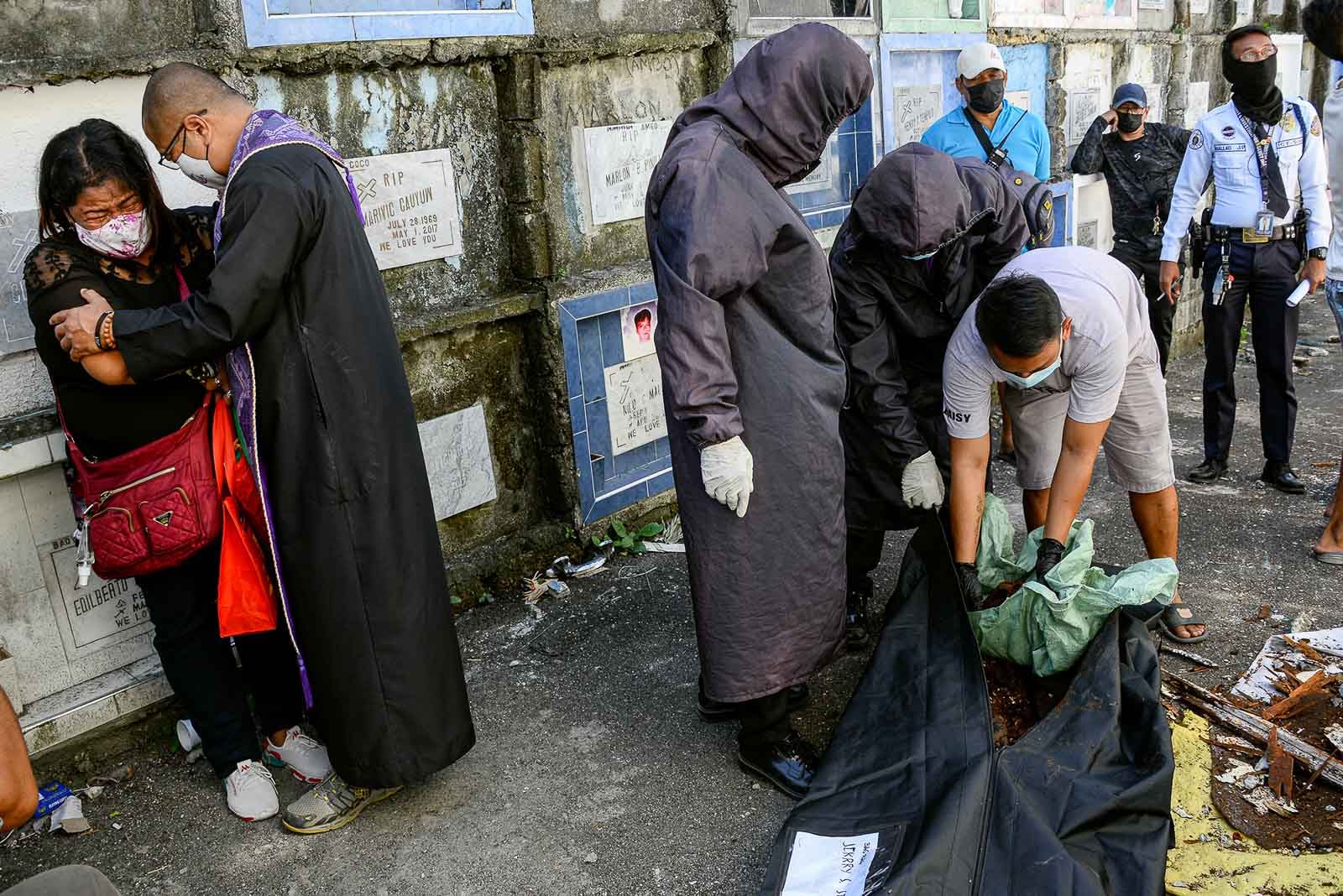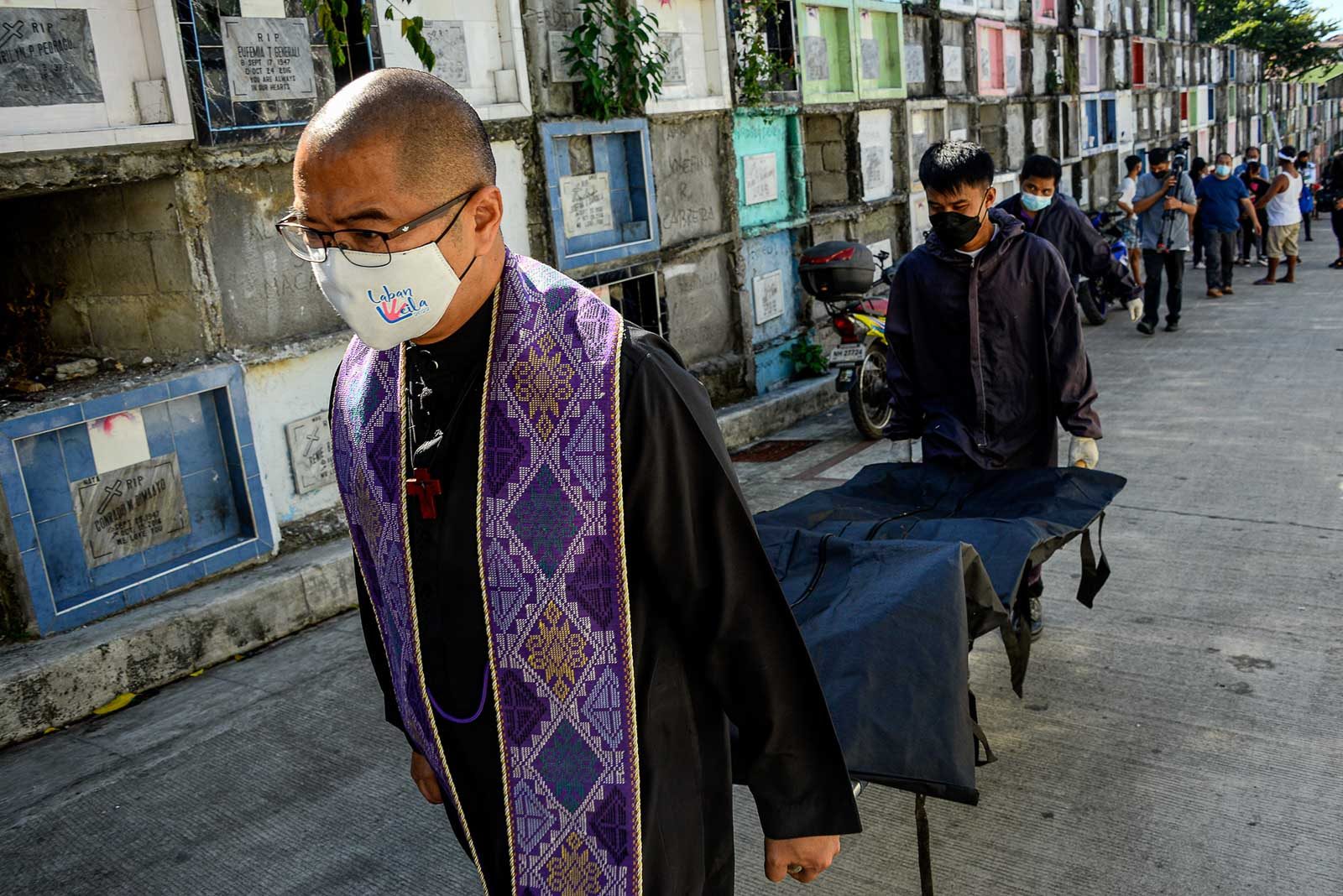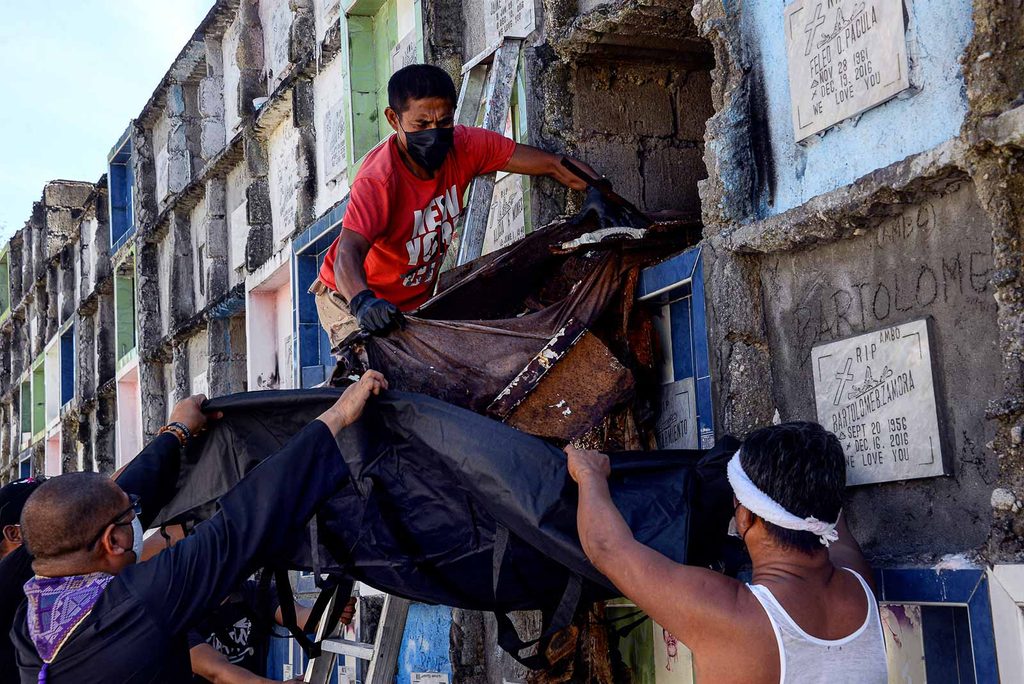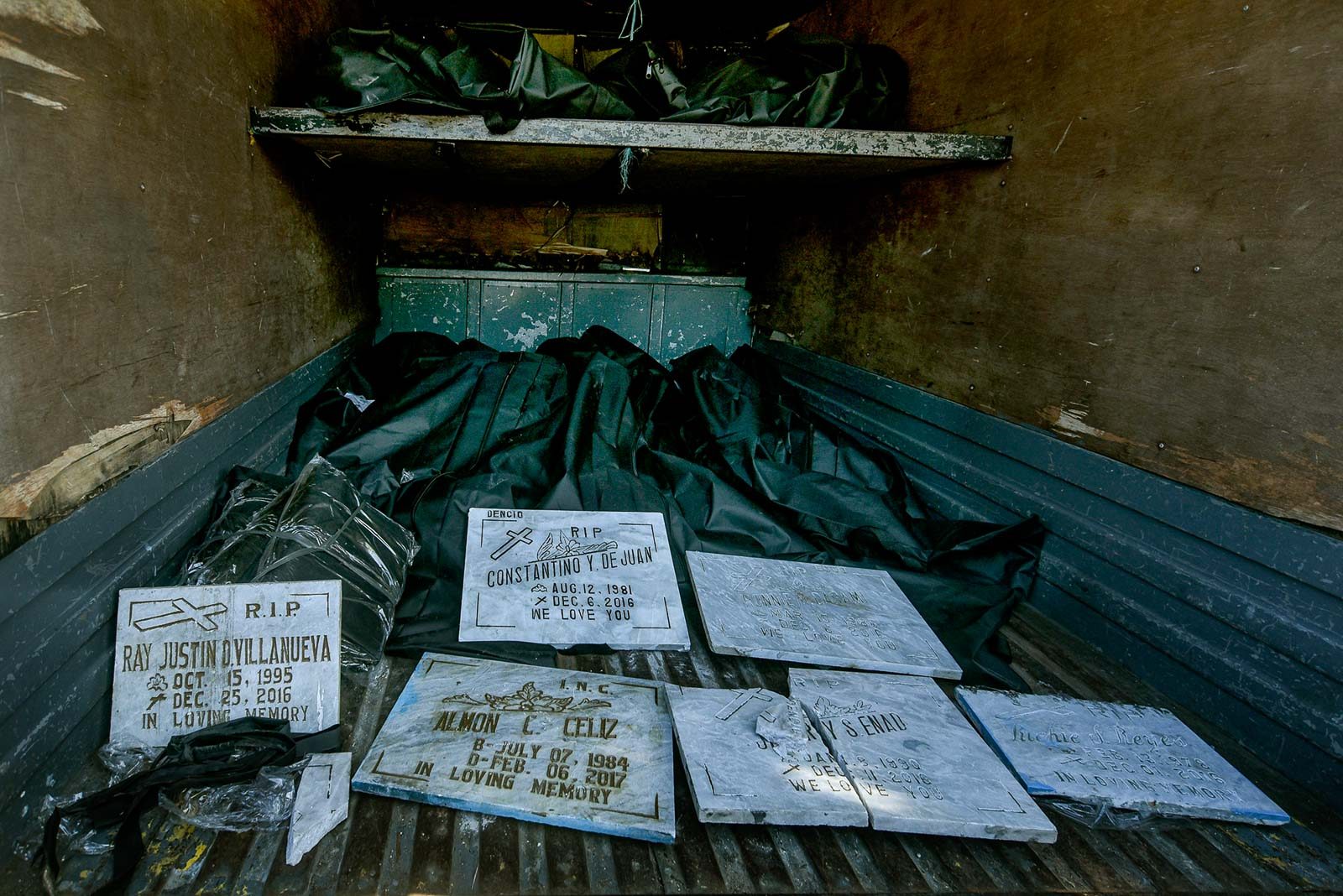SUMMARY
This is AI generated summarization, which may have errors. For context, always refer to the full article.

The morning’s first destination was Richie Reyes.
Cool winds blew and faint sunlight seeped through the morning when the Philippines, a predominantly Catholic country, celebrated the Feast of the Immaculate Conception, when Mary was conceived in her mother’s womb free of sin.
On December 8, 2021, three mothers convened at the foot of the Tala Cemetery’s front gate, each carrying the memory of a son and a husband slain in a so-called war. The war, President Rodrigo Duterte promised, would cleanse the land of addicts and illegal drug users and save their men. The women lost theirs.
A priest arrived. One of the women stepped forward and walked with him towards the tombs, followed by the two other mothers and an entourage of photographers, stealthily hiding their cameras from the guards.
The procession descended into the sandy main road, then headed into a pathless landscape of crypts and niches. The visitors hopped over the graves, whispering apologies to each headstone they trespassed.
The priest’s robes revealed rubber shoes underneath as he hopped over the crevices, where dead branches and dry bones lay, left to further decompose.
In front of the tallest apartment tomb in a block marked by a fig tree. They found him – Richie.
Cresalie Agosto, the woman leading the pack, pointed to her husband, the lone niche with its face in ruin, its headstone hanging by the little concrete that was left.
“Tinibag nila, Father,” she said. (They broke it open, Father.)
Over five years have passed since the President’s declaration of war. At least 7,000 have been killed at the hands of police officers alone. Human rights groups counted at least 30,000 slain as of 2019 – mostly shot dead inside or near their homes – by both policemen and armed vigilantes. This number has risen since then.
The land still has not been cleansed. Even the President conceded this, but he is about to retire from his Palace by the river.
In the graveyards, the thousands of poor killed under his grand plan face eviction.
Evicting the dead

Five men arrived shortly, two with a hammer and a metal ladder on hand. The oldest man standing three tombs away greeted the priest with a smile, then signaled to the gravediggers to begin.
Charly Gacos, 53, was that morning’s leader. He had dug up graves for decades. He was there long before priests or a scrum of photographers came, and he was there even before men like Richie started being buried in the cemetery after the tough-talking President rose to Malacañang. There were many who had been killed back then, he said. The killings slowed down during the pandemic.
Charly felt pity, but he still needed to evict the dead. He had no interest in remembering their stories. All he needed were their names and when their leases would expire. Richie was buried on December 8, 2016. Expiration date: December 8, 2021.
“They should have known it would expire when they applied for the lease,” he said in Filipino.
Cresalie told the priest that the gravediggers broke Richie’s niche on December 1, using his date of death as the starting point in the five-year countdown. She was not given the courtesy of a phone call.
Charly said his men only followed orders from the cemetery administrators. The cemetery administrators used to call families ahead of evictions, but they stopped as many chose not to extend their leases. As soon as the leases expired, the unclaimed remains got labeled “abandoned.”
The leases cost P4,500 per term – higher, if the administrators and gravediggers buttressed them with “additional fees” for “processing” and “labor.”
Most of the families could not pay. The dead who were buried were their breadwinners – fathers, brothers, sons.
This was the fate of the abandoned: graves were busted open, the bones were raked by bare-handed diggers, and scooped into emptied rice sacks. They were thrown together in bundles into mass graves, in a state of purgatory before they were burned.
The cemeteries could not delay the evictions because they no longer had space while people continued dying in Metro Manila, one of the most densely populated regions in the world.
Once the gravediggers destroyed a grave and dumped its remains with the mass of others, it was impossible to get these back – unless the families first broke the graves open themselves.
Such was the purpose of the mothers’ pilgrimage to the cemetery, a mission to save what their loved ones had become before they were lost forever.
No RIP

They called it Project Arise. Its main objective is to save the bones of the drug war’s dead before they are discarded.
2,167
drug suspects killed in duterte’s anti-drug campaign by DECEMBER 31, 2016 – VICTIMS AT RISK OF EVICTION FROM THEIR GRAVES
The effort is led by Father Flavie Villanueva, the grave-hopping priest who is regarded as a savior by hundreds of drug war-ravaged families.
The idea for the project began in December 2020, when some families started receiving notices of eviction.
Mariza Hamoy, the mother of 17-year-old Darwin Hamoy, who was shot dead after being told to buy cigarettes in 2016, called Villanueva. She told him she could afford extending the lease, but she would rather have Darwin back home in an urn than have him stay in a boxed tomb she could not even visit during the notoriously crowded day of the dead.
Villanueva began the exhumations in May 2021 with seven bodies.
As of December 2021, Villanueva has prayed over 44 remains that were exhumed, all of them victims of Duterte’s drug war.
He knew the number was only a fraction of all the people killed in 2016.
He knew of families clueless about the evictions happening, and families who knew but let the evictions happen just the same – too poor to worry about the bones of their deceased when food on the table was their more pressing problem.
To this, the priest repeated a worn-out call: everyone who can be saved must be saved.
Through the Arnold Janssen Kalinga Center, which he leads, Villanueva pooled in funds to help the families with their exhumations. The center also offered to counsel.
The number of drug war deaths spread throughout the country has left Villanueva uncertain about how he could exhume more remains.
The exhumed remains, so far, have mainly come from the northern Manila cemeteries that serve poor communities: Payatas and Batasan in Quezon City, the same places that bore the brunt of a relentless drug war.
No cop, vigilante, or anyone responsible for the 44 exhumed has been put on trial. All but three of the deaths are subjects of cases pending before the courts, with families fighting what looks like a losing battle.
Because hardly any of the police-perpetrated killings resulted in a complaint, the cops involved in the operations have remained in the service, rising in the ranks as their bosses bagged plum positions.
Buried justice

After the two gravediggers completely destroyed the cover of Richie’s niche, two men in medical gear arrived with a body bag and a stretcher.
The diggers first pulled out a roll of tarpaulin that was used as a banner during Richie’s wake. Then came the scraps of wood that was the coffin. Then finally came the bones.
The priest held up two corners of the body bag to catch the remains as Cresalie wept behind him. Cameras clicked in the background as a photographer taking closeups hummed a song.
The diggers declared their job done. The bag was zipped, taken to a van, its contents destined for cremation.
Now calm, Cresalie joined the exhumation group as it proceeded to the grave of the next family.
Five years may have passed, but Cresalie felt like time had stopped and was playing in a loop.
“Nothing has changed. Like what happened to me, the system of our government continues. EJKs (extrajudicial killings) continue,” Cresalie said.
She called for justice, even when she, like thousands of other families, still had no lawyer or a complaint filed against the police who took the life of her loved one.
In Duterte’s war on drugs, police have been jailed only once, in the case of Kian delos Santos. Kian’s was the only case with CCTV footage that captured cops as they were about to kill a teenager they wrongfully declared a drug suspect. The rest had no cameras rolling during their operations.
The International Criminal Court is investigating Duterte for the drug war and his role when he was mayor in the so-called Davao Death Squad, whose patterns of EJKs were clearly adopted by the police nationwide when he became president. It is a slow process that may take years to resolve. And, even if anyone was convicted, the ICC would count on the Philippine National Police – the same agency on trial – to implement any arrest order.
Still, on that cool, dry day of the Feast of the Immaculate Conception, Cresalie, the wife of Richie Reyes, showed up. The priest told her that watching the exhumation could be unbearable. Still, she came.
“We may not get justice now, but someday soon, we will get it. We may not get it here but in heaven,” she said. “But the reason why I am here now is for those who killed my husband to pay.” – Rappler.com
Add a comment
How does this make you feel?



![[WATCH] Bamban POGO scandal: There’s a bigger fish than Alice Guo](https://www.rappler.com/tachyon/2024/07/inside-track-tcard-bamban-pogo.jpg?resize=257%2C257&crop=435px%2C0px%2C1080px%2C1080px)
![[Vantage Point] China’s silent invasion of the Philippines](https://www.rappler.com/tachyon/2024/07/TL-china-silent-invasion-july-16-2024.jpg?resize=257%2C257&crop=318px%2C0px%2C720px%2C720px)








There are no comments yet. Add your comment to start the conversation.